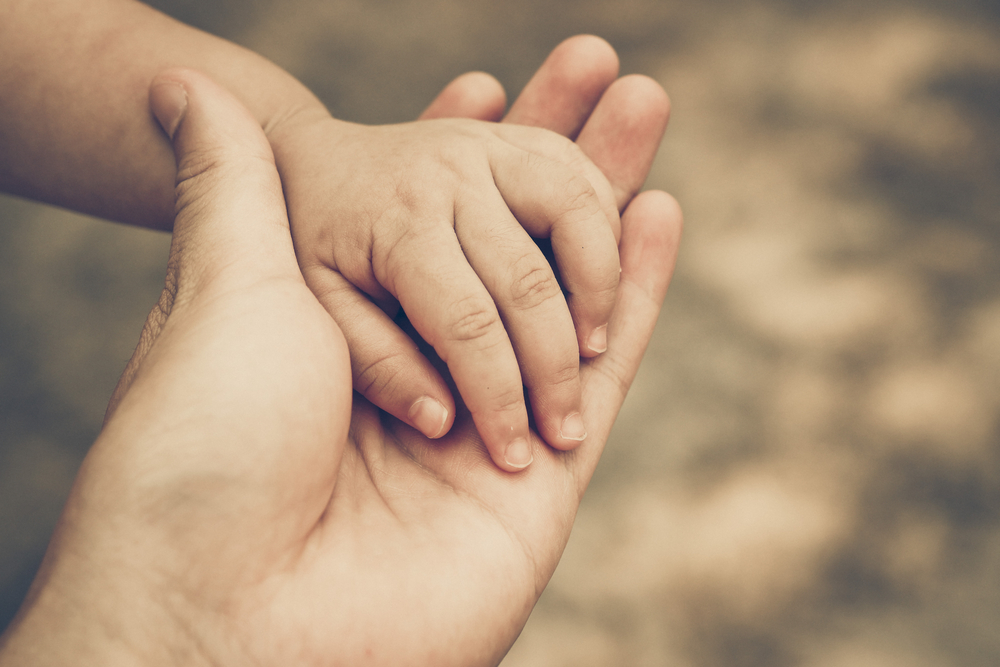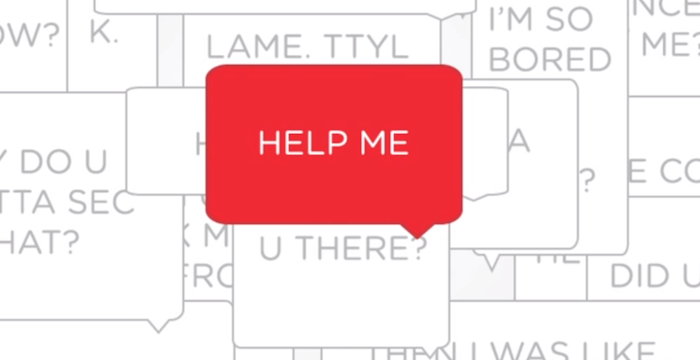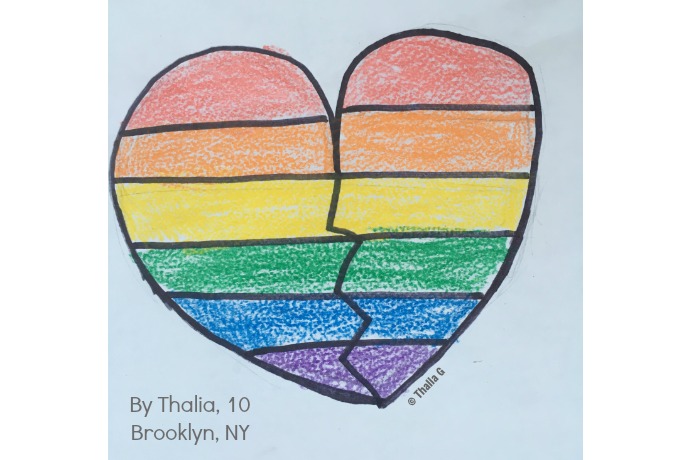It’s been somber mood around here over the past 24 hours, as our hearts go out to the loved ones of the 100+ innocent people tragically murdered or wounded at the Pulse Nightclub in Orlando on Sunday morning. My own 10-year-old daughter Thalia drew the broken rainbow heart image above in response, which I think captures so much of what we’re all feeling about this despicable and senseless act.
(I shared my story of how it came about with Cosmopolitan, and you can read more about it there.)
There are far too many tragedies like this one, far too many times our readers reach out asking for help on how to talk to their children about tragedy. And yet, here we are again.
All I can say is that children understand love easily. What they don’t understand is hate.
Whether it’s an international terrorist attack, a domestic terrorist attack on innocent people in schools or churches or nightclubs, or even a natural disaster, every new tragic incident is one too many. Too many stories, too much senseless death, too many times my beautiful, wide-eyed children look up at me and ask, “but why?”
It’s brutal.
We don’t want to make mistakes as parents. We want to know just how much we tell our kids and to have the exact perfect words every time. We’ll stumble, of course, but we can try.
So I ask myself: What do they need to know? Which facts do we explain while omitting others? Do we shield them from the horrors of the world and watch cartoons and keep the news off? If we avoid the subject, do we risk their friends talking to them before we do?
The one tip I’ve always appreciated in these times is that yes, it’s okay to turn off the news and get off social media. Self-preservation is not the same as ignorance so don’t feel guilty if you need to go out and get ice cream or bake a pie or sit in a park or walk around a museum. Also remember that with the 24/7 news cycle, there’s generally no new news every minute; it’s just the same images interspersed with (often wrong) speculation to keep viewers tuning in, and it can be numbingly addictive while offering no real benefit.
My other top tip is that when it comes to talking to your kids, ask them questions first (So, what do you know?) and let their own knowledge guide how you discuss hard events.
But where do you go from there?
I’ve looked around the web for help.

What I’ve discovered is that while there are lots and lots of truly helpful organizations, especially when it comes to mental health issues, they don’t necessarily have the best online resources. Some of their articles are too clinical or institutional, and some hardly scratch the surface of the tough questions we all want answers to as parents.
So after a lot of time online (no doubt in an attempt to redirect my own feelings of sorrow into something more productive and positive) here are the websites and articles I’m finding most clear, comprehensive, and valuable to me personally. In fact, they’ve already helped me start talking to my kids about violent tragedies in the most appropriate way I can muster.
I really hope they help some of you too.
I also urge those of you who agree with us that the levels of unnecessary gun violence in this country has reached crisis proportions, to read our post about the best organizations helping to prevent unnecessary gun violence. I find that doing something — whether making a donation, writing your senator or congressional representative, aligning with a cause you believe in, or even having your kids draw pictures like mine did — can be incredibly healing on its own.
PBS Parents
It surprised me, but PBS Parents is the first place I’d visit. They have an excellent, comprehsensive article on talking to kids about bad news that’s broken down by age. It helps you identify what kids understand about the news at various stages, like how a preschooler may confuse reality and imagination. I also like the advice to avoid watching the same images repeatedly; children during 9/11 literally thought the buildings were falling over and over again. School age kids, however, can start processing the difference between what’s happening in their worlds versus the world at large and can understand the news in a more mature way.
My favorite tip: Consider tuning into the radio (I’m always a fan of NPR’s coverage) instead of TV so that kids get the story without potentially traumatizing imagery.
National Child Traumatic Stress Network
An absolutely outstanding series of resources comes from the National Child Traumatic Stress Network (NCTSN) website which provides wonderfully helpful, accessible lists for parents and caregivers that are specific to bombings and other tragedies involving mass violence. You can download the charts which detail various reactions by age, appropriate responses, and then specific things you can do or say to help your kids.
Especially take a look at the PDFs with tips for parents of school age children after disasters and tips for helping preschool children after disasters which offers parents very specific things they can say to their kids in response to their questions and behaviors. Like, “I know your friends have said more disasters are coming, but right now we are in a safe place.” Or “When scary things happen, people have strong feelings like being mad at everyone or being very sad. Would you like to sit here with a blanket until you’re feeling better?”
I find that incredibly helpful, especially when knowing the right thing to say to our kids is one of the biggest challenges for parents at these times.
The Mayo Clinic
The Mayo Clinic offers a few pages on helping kids to cope with tragedy and the clear, concise advice is broken down into simple bullet points. The essence of the advice is that you tell truth, focus on basics, and skip details that probably aren’t necessary. I really like the tip not to speculate about what might (or might not) happen since we don’t know. I also like that it’s important to spend some extra time together, so cuddle up and watch a fun movie, read a book together, play a board game. It’s probably good for you, too.
Last night we went out and grabbed ice cream, and ate it before dinner — that worked for my girls.
The American Association of Pediatrics
The AAP has a thorough, if a bit clinical, assessment of promoting adjustment and helping kids cope after disaster and crisis from medical perspective. You’ll find advice like like identifying adjustment difficulties, providing psychological first aid.
The Coalition to Support Grieving Students
The APP also provided this link to The Coalition to Support Grieving Students. This is definitely geared to school personnel and focuses more on tragedies that can happen personally to students, or to school communities. However, I think there’s some good, applicable info that parents can use under many circumstances, like what not to say. Just know the info is presented in video form, so you might watch when kids aren’t in the room.
The Substance Abuse and National Mental Health Service Administration
The website of the SAMHSA is one I wasn’t familiar with myself. It offers a lot of solid info particularly pertaining to people in psychological distress after a tragic event or crisis. A lot of it focuses on natural disasters, but there is a page on getting help after an incident of mass violence including a good link to concise info from the American Psychological Association.
The National Center for School Crisis and Bereavement
I learned about the NCSCB, part of the USC School of Social Work, through an interview with its director David Schonfeld, in an issue of a Boston University (my alma mater) newsletter. The site is helpful, and provides links to some of the organizations I’ve already listed here. However this quote of Schonfeld’s really resonated with me so I wanted to include it here:
I often hear adults say they don’t want to talk about an event because they might upset the children. I point out, “No, you’re not making them upset; they are already thinking about it. If you ask them how they are doing and they cry, you’re not upsetting the child—you are just giving them permission to show the upset.”

Hotlines offering help for parents, too
If you need someone to talk to, or are battling your own stress, anxiety or PTSD symptoms, you need to get yourself healthy too. You can always call the SAMHSA’s own disaster distress hotline at 1-800-985-5990 or text TalkWithUs to 66746 to connect with a trained crisis counselor.
You can also text START to 741-741 to live text with a trained specialist at the Crisis Text Line who will respond quickly, and help keep you safe and healthy with referrals if you need it.
And the National Suicide Prevention Lifeline is NOT just about suicide; if you’re having anxiety or depression, call 1-800-273-TALK any time to connect with a trained counsellor at a crisis center who can also refer you to mental health services in your area should you need it.
There is no stigma here whatsoever. There’s no weakness in feeling depressed or anxious and asking for help yourself. It simply makes you human. Please remember that you can’t help your kids unless you’re okay too.




I wanted to thank you – partially for posting such a simple image that’s been so moving for so many – but mostly for teaching your kids that love is love. It’s easy to look at news like the Orlando tragedy and lose heart, thinking that it could have easily been me or my wife or any of our LGBT friends. I’ll likely never meet you or your kids, but thank you for giving back some of the hope that it’s so easy to lose.
That makes me tear up Laura, thank you so much for your kind comment. Especially for those of us who have the privilege not to face specific kinds of bigotry, I think that gives us even more of an obligation to talk to our kids about it — as I’m so often reminded by friends wiser than I am.
If you’re ever in the NYC area, look me up. My heart is with you and your family during this truly hard, dark time.